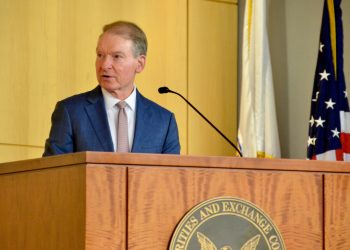TLDR
- House Republicans proposed a crypto regulation bill on May 5.
- The bill splits oversight between the SEC and CFTC.
- It defines key crypto terms and asset types.
- DeFi and self-custody wallets get protection from strict regulation.
- Democrats may oppose the bill over political concerns.
House Republican leaders introduced a draft bill to establish a federal framework for regulating the U.S. cryptocurrency industry. The proposal aims to clarify the roles of the Securities and Exchange Commission (SEC) and the Commodity Futures Trading Commission (CFTC) in overseeing digital assets.
Full analysis coming shortly this afternoon. Here’s a teaser:
TLDR:
The market structure draft is an incremental, albeit meaningful, rewrite of FIT21 that tightens affiliate sale rules, replaces the idea of the SEC certifying decentralization with an ongoing “mature blockchain”… https://t.co/dRJ0xSOVIs— Justin Slaughter (@JBSDC) May 5, 2025
House Financial Services Chairman French Hill, Agriculture Committee Chairman Glenn “G.T.” Thompson, Subcommittee Chair on Digital Assets Bryan Steil, and Commodity Markets Subcommittee Chair Dusty Johnson released the draft. It outlines legal definitions for critical industry terms and sets boundaries for SEC and CFTC jurisdiction. The lawmakers said the bill intends to close regulatory gaps while offering long-term clarity to market participants.
Proposed Classifications and Regulatory Pathways
The draft introduces several definitions, including “digital commodity,” “blockchain system,” “decentralized governance,” “permitted payment stablecoin,” and “mature blockchain system.” It also defines “end user distributions” such as mining and staking rewards as non-securities.
Under the proposed framework, digital commodity exchanges, brokers, and dealers would register with the CFTC. The SEC would retain oversight over securities and certain hybrid assets. Entities offering custody, trading facilitation, or customer interface services must comply with new disclosure and registration standards.
Chairman Thompson emphasized that legal clarity would provide long-requested certainty for developers, investors, and users operating in the digital asset space. Steil described the bill as a milestone for expanding digital asset infrastructure within a legal structure.
DeFi Protections and Self-Custody Rights
The draft legislation includes provisions to protect decentralized finance (DeFi) protocols and user self-custody rights. It exempts DeFi protocols and messaging platforms from traditional financial regulations if they do not exercise control over user funds.
The bill also includes restrictions preventing the U.S. Treasury and Financial Crimes Enforcement Network (FinCEN) from limiting individuals’ ability to hold or use self-custody wallets. These clauses seek to support individual control and innovation in the crypto ecosystem without expanding government oversight into user-managed systems.
Legislative Process and Political Response
A joint “American Innovation and the Future of Digital Assets” hearing was scheduled for May 6 to discuss the proposed bill and gather stakeholder feedback. Chairman Hill will lead the hearing to begin legislative deliberations.
Democratic lawmakers, led by Ranking Member Maxine Waters, have expressed concern over the hearing and the draft’s alignment with former President Donald Trump’s crypto-related positions. Some Democratic members may boycott the session or hold a parallel hearing focusing on Trump’s connections to the crypto industry. A staff member indicated that committee rules required consensus to advance the hearing, raising potential procedural objections.
The draft mandates joint rulemaking by the SEC and CFTC and includes calls for studies on non-fungible tokens, DeFi, and blockchain infrastructure. Lawmakers stated that the framework will continue to evolve through public input and interagency cooperation.


















